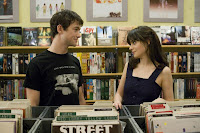After the disaster of “Spider-Man 3,” which all but destroyed the hero that made superheroes box office gold, the world wasn’t exactly craving more Spider-Man. “The Amazing Spider-Man” isn’t the superhero movie we needed, but we got it, and it’s actually a stellar installment of the myth of a man in red spandex.
To compare “The Amazing Spider-Man” with Sam Raimi’s “Spider-Man” is to tiptoe on a tightrope, as saying that the new one is better than the old one would be potentially putting down something that I deeply cherish. “Spider-Man” was one of the first movies I watched multiple days in a row when it first arrived on DVD, and it spurred an interest in comic books that led me to a giant box full of them in the attic (benefits of having an older brother). But then again, what makes “The Amazing Spider-Man” work is its ability to build on and improve the flaws of its predecessors.
“The Amazing Spider-Man” seems most similar to the fantastic, revisionist Ultimate Spider-Man graphic novels. However, “The Amazing Spider-Man” also takes on a life of its own. It starts at the very beginning, during one of the crucial moments of Peter Parker’s life. As a child, Parker’s father, a brilliant scientist with a controversial view on genetics, is under constant threat. In order to keep Peter safe, he is to go and live with his Uncle Ben (Martin Sheen) and Aunt Mae (Sally Field) in their working class Queens home. One thing remains constant throughout the evolution of the Spider-Man Story: poor Uncle Ben can never catch a break.

Years later, and Peter is the nerd we always knew. Except this time, he’s more of brilliant punk than a plain old brainiac. Spotting a skateboard, square glasses, and an old jacket, he looks more like the new generations definition of cool kids as seen in “21 Jump Street” (hint: reduce, reuse, recycle). Andrew Garfield plays him with just the perfect amount of teenage awkwardness that is uncomfortable and funny all at once. Because of this, him and Emma Stone, who portrays Gwen Stacy, bounce off each other well as love interests.
“The Amazing Spider-Man” is very slow to start. However, there is a lot of necessary world-building that goes on which does not pay off until later in the story. But really, the movie could have done without the scene in which Peter researches the mystery of his father’s death by searching on the Internet. Obviously, this is the way research is done nowadays. However, there is nothing interesting about watching someone typing words into a search engine, nor does it make someone look any smarter.
Once Peter is bitten by the radioactive spider and starts to experience symptoms does the story really take off. It starts off with a series of ingenius sight gags, directed to comedic perfection by Marc Webb. Webb, who previously directed “(500) Days of Summer,” shows off flashes of self-awareness that first established his talent. After all, we are dealing with a man with spider-like powers who wears a tight red body suit. There is something inherently silly about that. Webb plays around with the humor, but without ruining all seriousness in the story. This was the biggest problem in “The Avengers,” and it does not get the best of the new “Spider-Man.”

Unlike many blockbusters, the action here is well shot and edited. It moves at a pace that anyone can follow, and it doesn’t alternate shots every millisecond. Webb’s indie sensibilities, overall, bring a much more humanized feel to the entire movie. However, there is a major action set piece towards the end, coupled with some emotional backstory, that comes off as quite trite. All I will say is that it involves crains, and I can picture the writers saying something like “we need an easy way to get Spider-Man from one place to another. I know: deus ex machina!”
The fact that “The Amazing Spider-Man” at all had me thinking about the nature of superheroes and comic books shows just how different of a superhero movie this is. It all stems from the creation of a “new” Spider-Man and Peter Parker. Putting a mask on is a way of being two different people at once, and then gaining the ability to do what you couldn’t without a mask on. The old Peter Parker is timid and clumsy, while the old Spider-Man will climb up the tallest of buildings without fear. Meanwhile, the new Peter Parker and Spider-Man are almost one in the same: they are both brilliant, sarcastic, and sometimes too proud and too much in need of getting even. As Peter Parker, he gladly shows off his new ability to jump by playing basketball and smashing the backboard. As Spider-Man, he spends a large chunk of time trying to track down Uncle Ben’s killer.
In addition, Spider-Man is not just a superhero here. Rather, as Police Chief Stacy (Denis Leary) describes him), he is an outlaw, roaming the city with his own code of justice, while hiding behind a mask. When he swings through Manhattan alone on silk ropes, it now feels more like a cowboy walking off alone into the sunset.

While the Spider-Man of the 2000s gained the ability to shoot webs from the spider bite, the Spider-Man of Stan Lee’s creation had to create the web blasters himself. This makes a big difference, as it reveals even more how smart Parker is. No more of that “Go web go!” stuff. Unfortunately, the movie forgets to include what happens when Spider-Man runs out of his webs, which was always one of the more interesting elements of the comics. Seeing Spider-Man fight bad guys without his webs is like seeing Samson without his hair. Only this Samson can jump much higher.
Superheroes, in general, were created to pull of the physical feats that humans could not. The first villains of Captain America and Superman were Nazis. “The Amazing Spider-Man,” in a way, is about what makes a hero. Peter can be a hero with or without the mask. If superheroes are made to do what humans are incapable of, then the point of one armed Dr. Connors’ (Rhys Ifans) cloning experiment was to prove that humans on their own are weak, and only with the help of the genetics of others can they truly excel. Maybe this is foolish, as the experiment goes awry and turns Connors into an evil lizard monster (not as ludicrous as it sounds). Humans might not have the strength or ability to grow back dismembered body parts that other life forms have the ability to do. However, they do have the ability to distinguish right from wrong.
I might be overanalyzing a bit here, but the fact that “The Amazing Spider-Man” at all put these thoughts into my head shows that this reboot runs deeper than one might imagine. It is in line with “Prometheus” as smartest blockbuster of the summer. The real difference between this Spider-Man and Spider-Mans past is character. By adding motivations to every action, the story no longer feels like a bunch of set pieces of a teenager having fun with his magical powers. “The Amazing Spider-Man” is far from perfect, but I truly appreciate its ability to take long stretches of time without blowing something up. The superhero movie has truly come a long way since its humble rebirth ten years ago.
Sidenote: Don’t see this in 3D.



